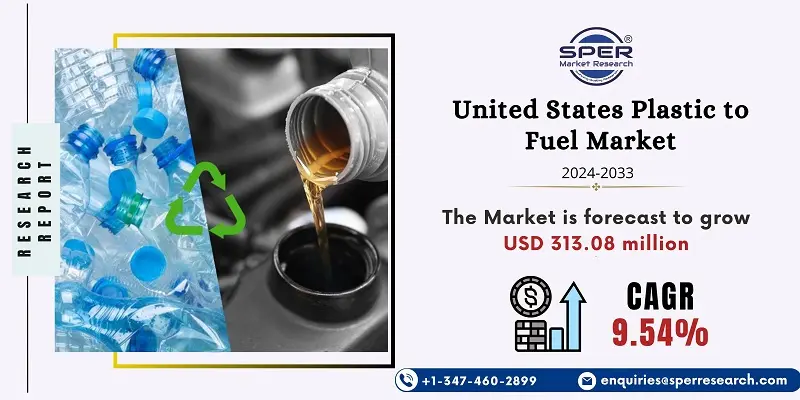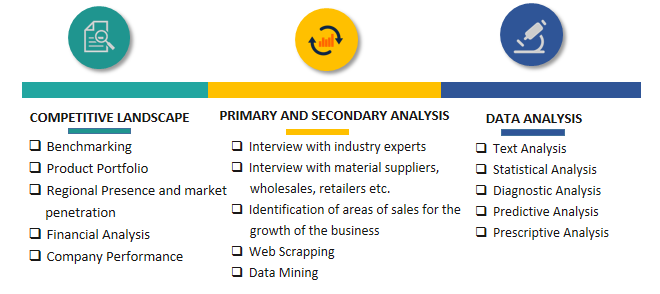United States Plastic to Fuel Market Introduction and Overview
According to SPER Market Research, United States Plastic to Fuel Market is estimated to reach USD 313.08 million by 2033 with a CAGR of 9.54%.
The report includes an in-depth analysis of United States Plastic to Fuel Market, including market size and trends, Product mix, applications, and supplier analysis. Plastic to fuel is a novel innovation that changes plastic waste into fluid powers completely to convey ecological advantages. The cycle includes the improvement of super perfect and super low sulphur fuel from plastic waste. The plastic is destroyed and warmed in an oxygen chamber at a temperature of 400 degrees Celsius. The cycle is called pyrolysis. The food and drink, petrochemical, beauty care products, and car industry are a portion of the significant end-client plastic of the Plastic-to-fuel industry. Plastic to fuel is a cycle, that changes plastic into fuel within the sight of oxygen, and the subsequent items are utilized in different enterprises including horticulture, auto, modern, food and refreshments, and others. Successive burning of plastic waste-determined energizes gives an ideal option in contrast to the ongoing utilization of petroleum derivatives.
- January 2023: Lummus Technology cooperated with the MOL Gathering to coordinate high-level waste plastic reusing, zeroing in on conveying compound reusing at MOL's offices in Slovakia and Hungary. This drive plans to improve supportability and round economy rehearses in these areas.
- March 2022: OMV marked a MoU with Wood plc to market OMV's ReOil® innovation, which changes plastic waste into pyrolysis oil. This cooperation expects to progress maintainable waste administration arrangements and advance the roundabout economy standards in the business.
Market Opportunities and Challenges
Opportunities- The plastic-to-fuel market remains an illustration of trust in the interest of expanding energy sources. It is fastened to petroleum derivatives like oil and gas, a circumstance loaded with weakness. Yet, Plastic-to-Fuel innovation blasts onto the scene as a unique advantage. It offers an extraordinary arrangement of speculative chemistry like the transformation of plastic waste into elective energy like gas, diesel, or manufactured gas. This not only stains its reliance on lessening petroleum derivative holds yet in addition infuses a portion of safety into the worldwide energy scene. By making another home-grown wellspring of energy, plastic-to-fuel might cut off the chains that tight spot us to unfamiliar oil imports and the cost swings that accompany them. Plastic-to-fuel offers a twofold triumph a cleaner option in contrast to petroleum products and a more steady energy future for countries around the world.
Challenges- Plastic-to-fuel technology resembles a specific client with a particular menu. Not everything plastic waste is made equivalent, and only specific sorts with a specific compound are reasonable for change into usable fills. In any event, for these viable plastics, benefiting from the change cycle depends on a perfect and very much arranged "plastic-eating routine." Food scraps or blended plastic sorts are undesirable fixings that can disturb the recipe. Further muddling matters, dependable enormous scope assortment, and arranging frameworks for plastic waste probably won't be promptly accessible in all areas. This restricts the promptly accessible top-calibre "fuel feedstock" for plastic-to-fuel plants. The innovation needs to expand its craving to acknowledge a more extensive assortment of plastics foster a heartier waste assortment and arrange a foundation to thrive. Moreover, changes in environmental regulations or policies governing waste management and alternative fuels can affect market dynamics and investment decisions in the plastic to fuel sector.

Market Competitive Landscape
United States Plastic to Fuel Market is a highly competitive arena due to the presence of multiple global and regional companies in the competitive environment. Leading companies in the industry are Agilyx Corporation, Brightmark Energy LLC, Cynar PLC, Green EnviroTech Holdings Corp, Plastic Energy Limited, Plastic2Oil Inc and PolyFuel Inc.
Scope of the report:
| Report Metric | Details |
| Market size available for years | 2020-2033 |
| Base year considered | 2023 |
| Forecast period | 2024-2033 |
| Segments covered | By Technology, By End Product, By Plastic Type
|
| Regions covered | Eastern America, Western America, Northern America, Southern America
|
| Companies Covered | Agilyx Corporation, Brightmark Energy LLC, Cynar PLC, Green EnviroTech Holdings Corp., Plastic Energy Limited, Plastic2Oil Inc., PolyFuel Inc.
|
COVID-19 Impact on United States Plastic to Fuel Market
The market for United States Plastic to Fuel market has been significantly impacted by the COVID-19 outbreak. The market for United States Plastic to Fuel saw a decline in demand as a result of rise in remote work need for more energy at residential sites. The pandemic has likewise also caused disturbances in the market as conversion facilities for fuel also faced problems due to operational constraints. The market overall improved as the restrictions begun to ease.
Key Target Audience:
- Municipalities
- Waste Management Companies
- Energy Companies
- Environmental Organizations
- Manufacturers
- Investors
- Regulatory Bodies
- Researchers and Academics
Our in-depth analysis of the United States Plastic to Fuel Market includes the following segments:
| By Technology: | PyrolysisGasificationDepolymerizationCatalytic ConversionOthers |
| By End Product: | DieselPetrol/GasolineKeroseneSynthetic Crude OilOthers |
| By Plastic Type: | Polyethylene (PE)Polypropylene (PP)Polystyrene (PS)Polyvinyl Chloride (PVC)Others |
Key Topics Covered in the Report:
- United States Plastic to Fuel Market Size (FY’2024-FY’2033)
- Overview of United States Plastic to Fuel Market
- Segmentation of United States Plastic to Fuel Market By Technology (Pyrolysis, Gasification, Depolymerization, Catalytic Conversion and others)
- Segmentation of United States Plastic to Fuel Market By End Product (Diesel, Petrol/Gasoline, Kerosene, Synthetic Crude Oil and others)
- Segmentation of United States Plastic to Fuel Market By Plastic Type (Polyethylene (PE), Polypropylene (PP), Polystyrene (PS), Polyvinyl Chloride (PVC) and others)
- Statistical Snap of United States Plastic to Fuel Market
- Expansion Analysis of United States Plastic to Fuel Market
- Problems and Obstacles in United States Plastic to Fuel Market
- Competitive Landscape in United States Plastic to Fuel Market
- Impact of COVID-19 and Demonetization on United States Plastic to Fuel Market
- Details on Current Investment in United States Plastic to Fuel Market
- Competitive Analysis of United States Plastic to Fuel Market
- Prominent Players in United States Plastic to Fuel Market
- SWOT Analysis of United States Plastic to Fuel Market
- United States Plastic to Fuel Market Future Outlook and Projections (FY’2024-FY’2033)
- Recommendations from Analyst
1. Introduction
1.1. Scope of the report
1.2. Market segment analysis
2. Research Methodology
2.1. Research data source
2.1.1. Secondary Data
2.1.2. Primary Data
2.1.3. SPER’s internal database
2.1.4. Premium insight from KOL’s
2.2. Market size estimation
2.2.1. Top-down and Bottom-up approach
2.3. Data triangulation
3. Executive Summary
4. Market Dynamics
4.1. Driver, Restraint, Opportunity and Challenges analysis
4.1.1. Drivers
4.1.2. Restraints
4.1.3. Opportunities
4.1.4. Challenges
4.2. COVID-19 Impacts of the United States Plastic to Fuel Market.
5. Market variable and outlook
5.1. SWOT Analysis
5.1.1. Strengths
5.1.2. Weaknesses
5.1.3. Opportunities
5.1.4. Threats
5.2. PESTEL Analysis
5.2.1. Political Landscape
5.2.2. Economic Landscape
5.2.3. Social Landscape
5.2.4. Technological Landscape
5.2.5. Environmental Landscape
5.2.6. Legal Landscape
5.3. PORTER’s Five Forces
5.3.1. Bargaining power of suppliers
5.3.2. Bargaining power of buyers
5.3.3. Threat of Substitute
5.3.4. Threat of new entrant
5.3.5. Competitive rivalry
5.4. Heat Map Analysis
6. Competitive Landscape
6.1. United States Plastic to Fuel Market Manufacturing Base Distribution, Sales Area, Product Type
6.2. Mergers & Acquisitions, Partnerships, Product Launch, and Collaboration in United States Plastic to Fuel Market
7. United States Plastic to Fuel Market, By Technology (USD Million) 2020-2033
7.1. United States Plastic to Fuel Market Size, Share and Forecast, By Technology, 2020-2026
7.2. United States Plastic to Fuel Market Size, Share and Forecast, By Technology, 2027-2033
7.3. Pyrolysis
7.4. Gasification
7.5. Depolymerization
7.6. Catalytic Conversion
7.7. Others
8. United States Plastic to Fuel Market, By End Product (USD Million) 2020-2033
8.1. United States Plastic to Fuel Market Size, Share and Forecast, By End Product, 2020-2026
8.2. United States Plastic to Fuel Market Size, Share and Forecast, By End Product, 2027-2033
8.3. Diesel
8.4. Petrol/Gasoline
8.5. Kerosene
8.6. Synthetic Crude Oil
8.7. Others
9. United States Plastic to Fuel Market, By Plastic Type (USD Million) 2020-2033
9.1. United States Plastic to Fuel Market Size, Share and Forecast, By Plastic Type, 2020-2026
9.2. United States Plastic to Fuel Market Size, Share and Forecast, By Plastic Type, 2027-2033
9.3. Polyethylene (PE)
9.4. Polypropylene (PP)
9.5. Polystyrene (PS)
9.6. Polyvinyl Chloride (PVC)
9.7. Others
10. United States Plastic to Fuel Market Forecast, 2020-2033 (USD Million)
10.1. United States Plastic to Fuel Market Size and Market Share
11. United States Plastic to Fuel Market, By Region, 2020-2033 (USD Million)
11.1. United States Plastic to Fuel Market Size and Market Share By Region (2020-2026)
11.2. United States Plastic to Fuel Market Size and Market Share By Region (2027-2033)
11.3. Eastern America
11.4. Western America
11.5. Northern America
11.6. Southern America
12. Company Profile
12.1. Agilyx Corporation
12.1.1. Company details
12.1.2. Financial outlook
12.1.3. Product summary
12.1.4. Recent developments
12.2. Brightmark Energy LLC
12.2.1. Company details
12.2.2. Financial outlook
12.2.3. Product summary
12.2.4. Recent developments
12.3. Cynar PLC
12.3.1. Company details
12.3.2. Financial outlook
12.3.3. Product summary
12.3.4. Recent developments
12.4. Green EnviroTech Holdings Corp
12.4.1. Company details
12.4.2. Financial outlook
12.4.3. Product summary
12.4.4. Recent developments
12.5. Plastic Energy Limited
12.5.1. Company details
12.5.2. Financial outlook
12.5.3. Product summary
12.5.4. Recent developments
12.6. Plastic2Oil Inc
12.6.1. Company details
12.6.2. Financial outlook
12.6.3. Product summary
12.6.4. Recent developments
12.7. PolyFuel Inc
12.7.1. Company details
12.7.2. Financial outlook
12.7.3. Product summary
12.7.4. Recent developments
12.8. Others
13. Conclusion
14. List of Abbreviations
15. Reference Links
SPER Market Research’s methodology uses great emphasis on primary research to ensure that the market intelligence insights are up to date, reliable and accurate. Primary interviews are done with players involved in each phase of a supply chain to analyze the market forecasting. The secondary research method is used to help you fully understand how the future markets and the spending patterns look likes.
The report is based on in-depth qualitative and quantitative analysis of the Product Market. The quantitative analysis involves the application of various projection and sampling techniques. The qualitative analysis involves primary interviews, surveys, and vendor briefings. The data gathered as a result of these processes are validated through experts opinion. Our research methodology entails an ideal mixture of primary and secondary initiatives.


